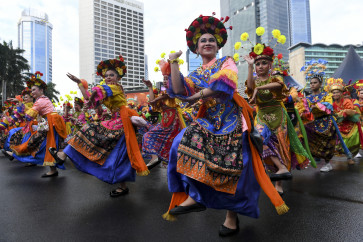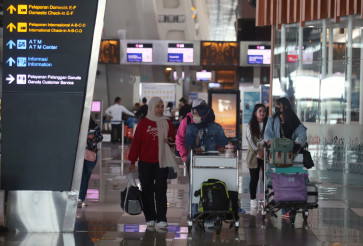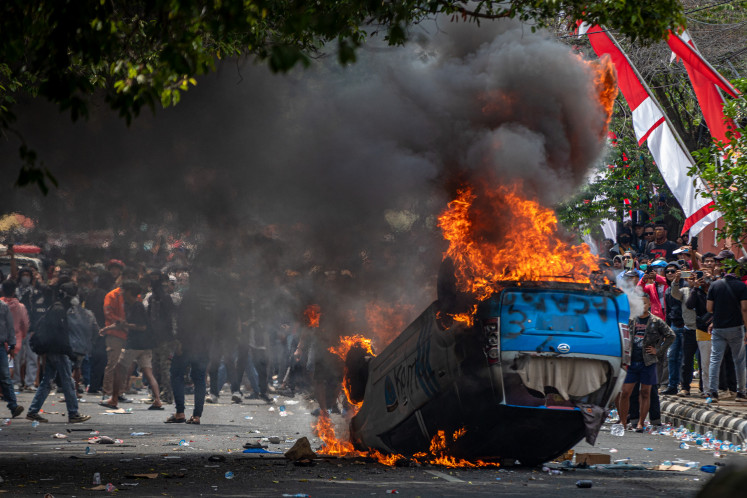Popular Reads
Top Results
Can't find what you're looking for?
View all search resultsPopular Reads
Top Results
Can't find what you're looking for?
View all search resultsCulture ‘flourishes’ amid strong protection of human rights
Human rights and cultural activists have said culture only thrives if the government has a strong commitment to protecting human rights, including freedom of expression
Change text size
Gift Premium Articles
to Anyone
H
uman rights and cultural activists have said culture only thrives if the government has a strong commitment to protecting human rights, including freedom of expression.
National Commission on Human Rights (Komnas HAM) member Amirudin Al Rahab expressed concerns about the future of cultural development in the country, saying how the movement to uphold human rights often came from a different direction to culture.
He said culture only developed if human rights values, especially freedom of expression, were protected.
Amirudin said culture was often overlooked in the fight to uphold human rights because oftentimes, the fight is too focused on the legal aspects and consequences.
“Values of human rights will be built up if they are internalized through [daily] social life. We should not care about human rights only because they carry legal consequences, but because they are our mutual need,” he said during a discussion on Friday.
The cultural scene in the country got a new boost after President Joko “Jokowi” Widodo pledged to disburse cultural funds to support production, training and travel for artists to develop themselves.
The plan was revealed amid a thriving cultural scene that has suffered amid growing conservatism in society.
Muslim organizations have protested academic discussions on the 1965 mass purge of the Indonesian Communist Party (PKI) and people who were accused of being its followers.
Mermaid statues in Ancol, Jakarta, were covered after criticism that they were too revealing of the women’s body.
Cultural activist Riki Dhamparan Putra emphasized the importance of building a cultural environment based on human rights values.
He said in many countries in the world, cultural development was achieved when freedom of expression exists. There should be room for people to improve their creativity as it would be essential to nurturing Indonesia’s cultural environment, he said.
“Acts to clamp down on freedom of expression hampers cultural development.”
A recent study by the Lokataru Legal and Human Rights Foundation shows more limited space for people in Indonesia to speak freely in public.
It is marked by numerous cases of abuse, intimidation and bans, which are predominantly rooted from government regulations.
“In many cases, the government’s repressive laws make human rights activists and other vociferous figures a target,” Lokataru researcher Nurcholis Hidayat said recently as quoted by tempo.co.
Several laws, such as the Electronic Information and Transactions (ITE) Law and Mass Organization Law, have also been used to silence people who voice their mind on social media.
On Feb. 4, 262 musicians submitted an online petition that rejected a draft bill on music proposed by the House of Representatives, in which they highlighted some points including how the bill was contradictory to Article 28E of the 1945 Constitution on how citizens have the right to freedom of expression and Law No.5/2017 on cultural advancement.
“We [musicians] have agreed that it is unnecessary for the House and the government to propose a [music] bill as it limits, hinders and represses the [creativity] of musicians,” Danilla Riyadi, a musician and the coalition’s representative said on online petition platform Change.org.
The draft bill was dropped amid strong opposition from musicians across the country.
Indonesia has ratified the International Covenant on Economic, Social and Cultural Rights (ICESCR), a multilateral treaty adopted by the United Nations General Assembly in 1966 that came into force in 1976 through the enactment of Law No. 11/2005 on the treaty’s ratification.
In Article 15 of the covenant, it is stipulated that the state recognizes the right of everyone to take part in cultural life and respect the freedoms indispensable for creative activity.
“[In reference to Law No.11/2015], everyone should be able to take pleasure in cultural activities if the ones actively involved in cultural development hold freedom of expression,” Amirudin said. (asp)










